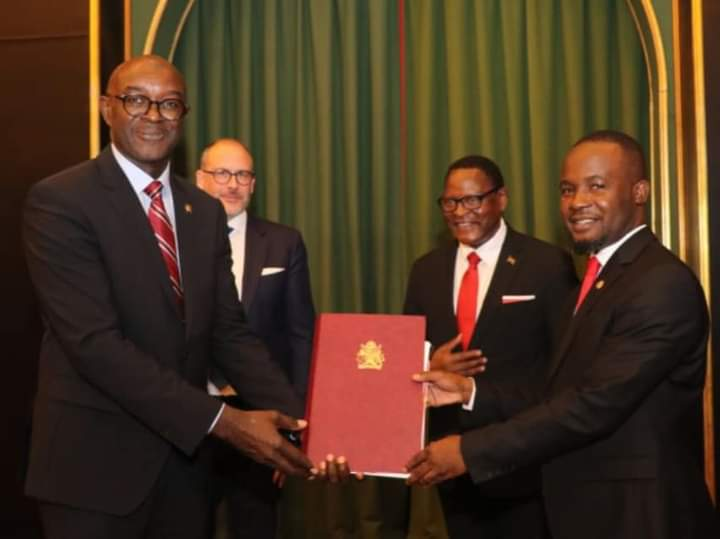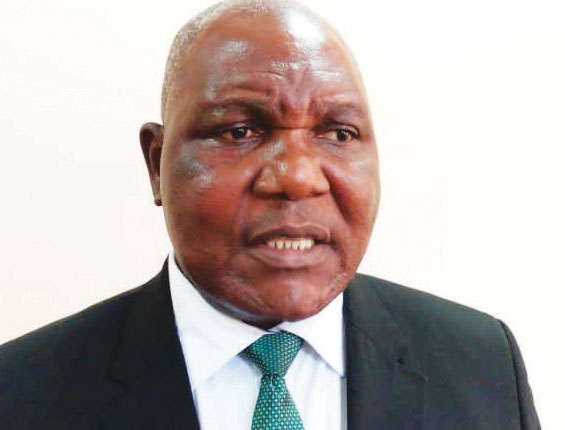BY JOSEPHINE CHINELE
Amid question marks over Bridgin Foundation, the Kamuzu University of Health Science (KuHeS) is going ahead with plans to construct a top medical care facility in hope of the arrival of funding from the controversial Brussels-based private equity and development arm.
Locals at Chilangoma, the proposed site for the project, which is near Chileka International Airport, claim the land is being acquired by force without adequate consultations or compensations.
Village Headman Denga, one of the chiefs in the area, told PIJ that uncertainty over compensations has left farmers with neither maize in the field nor money to restart their lives elsewhere.
“It was an order…about 15 people came from the DC’s office and told us that they are getting our land, and they want to immediately begin valuations whether we were in agreement or not. We had no chance to ask questions or give our views, they had made a decision from where they were coming from. We were afraid because amongst this group were police officers,” said the chief.


TA Kuntaja (Navy Blue suit) his subjects, Minister of Health and KuHes officials at Chilangoma site in December
The Lazarus Chakwera administration distanced itself from the foundation even in the face of earlier pomp and fanfare signing of a grant agreement to the tune of $6.8 billion US dollars.
PIJ has learnt that the university is proceeding with plans to partner with Bridgin to construct a high-tech hospital project in Chilangoma in Blantyre, with communities at the site, told to relocate their homes and farms away from the land even before compensation and a resettlement plan is implemented.
According to residents of Chilangoma, the Government allegedly ordered the people to discontinue farming activities on the site to pave the way for the US$1 billion (MK1 Trillion) worth project.
In an interview, KuHeS first Vice Chancellor, Professor MacPherson Mallewa confirmed that the institution is going ahead with the project with funding from the government and Bridgin Foundation regardless of the controversy.

“We are requesting funds from the government, but we are not allowed to disclose the figures at this point until we know that funds are available….OPC handles compensation issues, so I am at least aware that OPC made that request,” he said.
Mallewa said he was optimistic about Bridgin’s funds, saying the funder was pushing the university “to speed up the process, so people could start seeing that it’s real indeed.”
“The Bridgin Philosophy is that they procure all equipment required for the project from abroad. The equipment will come from Europe, America, and Israel among others, I can’t remember the whole list. All I know is they approached various companies for this,” Mallewa added.

Following the signing of the agreement, Bridgin’s credibility has come under the spotlight. Critics say there are a plethora of projects across the world that the Foundation failed to support despite similar pledges such as $120 million to Kathmandu University in Nepal.
According to the Development aid.org website, the organisation signed an agreement in December 2019 but had not honoured it one year later.
Nepal’s Ministry of Finance and the University Grants Commission of Nepal reportedly advised the university not to sign the agreement after similar questions over credibility were raised, but the country’s Prime minister pushed ahead with the agreement.
Bridgin appears to have been in a dozen African countries, too, pledging funds for development.
In early 2022, the Foundation pledged to support Uganda with $500 million towards the construction of a state-of-the-art teaching hospital at Makerere University. The grant also includes $65 million for the construction of the headquarters for the Regional Universities Forum for Capacity Building in Agriculture (RUFORUM)— a consortium of 163 African Universities operating within 40 countries in Africa, including Malawi.
The project included the construction of a multipurpose office building, a hotel, a conference centre, a high-tech laboratory facility and visiting scholar facility. The projects are yet to commence.
On the other hand, information about where the Foundation, registered in Belgium and led by Tanko Mouhamadou, has had success is scanty. Its website offers little. (All efforts to speak to Bridgin Foundation have not materialised.)
Compulsory Acquisition
A representative for the affected households, Ricky Kamtema, said authorities are using threats instead of holding open dialogue over the matter.
“Our worry is they have created a hunger situation. People will have no food this year. They (KuHes and Government) appeared to be in a hurry with this project and yet there is nothing happening up to now,” he lamented.
Kamtema added that authorities threatened to raze down maize crops in fields at the planned site, leaving farmers in limbo.
“I am a commercial farmer now losing income due to the indefinite waiting period. We don’t know how much we are receiving or where we are going. We last had a meeting in November,” he added.
He said Government appeared to be in a hurry with this project and yet there is nothing happening up to now.
Kamtema added: “They threatened to cut our maize crops should we attempt to do farming this season. They (Government Valuers) found me cutting sugar cane which I wanted to plant, and they boldly told me not to plant because I’m not going to be compensated for that. Just like others in this area, I am a commercial farmer now losing income due to the indefinite waiting period. We don’t know how much we are receiving or where we are going. We last had a meeting in November.”
He alleged that the compensation valuation exercise has not been transparent as the communities were ‘forced’ to surrender their land for the development purposes without a formal due process.
“We decided to engage our independent valuers, as we could not trust theirs. Our traditional leaders told us that we will vacate this place whether we like it or not because the Council said they can’t go to any other place. They have no money to buy another land elsewhere, plus they are looking for a land that’s near an airport,” Kamtema said.
He said the land was initially customary, where people settled and did their farming. They inherited it from their forefathers, “At the moment, nobody knows the compensation amounts. When we concluded our valuation, we wrote to them, so we could have dialogue, but we have not had any response until now.”
We have learnt that all chiefs of the area were afraid to comply to do this process as they were severely threatened by TA Kuntaja with removal from their chieftaincy should they allow an independent valuation to be done.
Eliya Kavalo, one of the affected community members, said authorities last year promised to pay compensations by September 2022 but nothing has happened.
“Some have been doing irrigation farming, others are into tree planting amongst other businesses. They all stopped because they were ordered to. There is a hunger situation here as we are not into anything to earn us money. We were stopped from doing any farming. We have had reservations to leave our land, but we have been powerless over the matter because they are the government, and we are ordinary helpless citizens,” he said.
Both Blantyre District Council and KuHes separately are waiting for funds to commence the project and compensations, but were tongue-tied on the expected total costs of the compensations.
But the government insists the land will be compensated for.
“Land was acquired through agreement with relevant people who are currently occupying and utilising the customary land at Chilangoma….. KuHeS will be the beneficiary of land after completing all acquisition processes by Malawi Government,” Commissioner for Lands (South), Kwame Ngwira said in a letter responding to Phokoso and Company, a law firm representing the affected community.
Ngwira denied the land is being acquired by compulsory.
In the letter, Ngwira clarified that government wanted to do its valuation first and inform the Project Affected Persons (PAPs) and should they be dissatisfied, they may then engage services of independent valuers at their cost.
OPC Order
TA Kuntaja said land identification was done by Office of President and Cabinet (OPC) and that it was not in his place (as chief of the area) to deny the development. He insists that he followed all ground procedures to pave way for this development.
“I held over 15 meetings consulting Group Village Heads and communities, and they agreed…. We are all happy… The Government told us the plan will make this area a city, we will have tarmac roads, hotel, Shoprite….if it gets near there will be more employment for people of this area….. People will no longer be required to go for external treatment, they will be coming here for treatment. My area has never had any development since Kamuzu era,” he excitedly said.
He dismissed claims that this project is threatening livelihoods and food security of people in this season. The TA bragged that his area has plenty of land and the affected people can relocate to other places within his jurisdiction.
“No one will starve due to this project. The people are doing farming as usual and the project will start after they harvest. In fact, the livelihoods of those affected will change due to the compensations they will receive….. The wise ones will build lodges,” TA Kuntaja confidently said.
He also believes the project will reduce witchcraft in his area, alleging that a good part of the land in question does not have houses and may usually be utilised for witchcraft.
“I want to see real planes flying over this area and not witchcraft planes. Those that are complaining about this place want to use this land to hurt others through witchcraft. I know people of this area very well……,” he said.
Waiting for Funds
Mallewa collaborated with TA Kuntaja that no one was stopped from doing farming activities, but confirmed that the institution is going ahead with the project with funding from government and Bridgin Foundation regardless of the controversy.
He clarified that KuHeS did not play any role in the identification of the land but was told by the Blantyre District Council that they identified land after going through all the local processes.
Tight-Lipped Government
Both Office of President and Cabinet (OPC) and Ministry of Finance are unwilling to give further information on the compensation amount details or their working arrangement with Bridgin Foundation.
“… I would suggest you contact OPC to find out how that particular submission was resolved….. We can’t comment until they have a final position,” Ministry of Finance spokesperson, Taurai Banda, told PIJ through WhatsApp.
Secretary to the President and Cabinet, Colleen Zamba could not pick up our calls or respond to our WhatsApp message. Other OPC officers, we reached out, expressed ignorance on the issue. But one Director of Policy, George Chande, whom KuHeS indicated to have been dealing with at OPC indicated that he attended only one meeting.
“I just attended a meeting where compensation status were discussed. Compensations are handled by OPC… All I know is that land was secured in Chileka, Blantyre. But I don’t have much information. If you want more information, you should speak with Ministry of Finance or the SPC because I’m not mandated to speak,” he said.
Secretive foundation
All efforts to speak to Bridgin Foundation have been futile. Their website does not have any details on their success stories elsewhere or their contact details. We emailed through the address on the website, but there has been no response.

Last month, Minister of Finance, Sosten Gwengwe told Malawians through a Times Radio interview that Bridgin Foundation will help fund several projects but no taxpayer’s money will be spent in the process.
“Bridgin Foundation’s principle is that we shouldn’t spend Malawi government’s money on any of their projects-not even a single Tambala. All projects will use their money and this instruction has been sent to all Ministries, Departments and Agencies,” he alleged.




.jpg)

